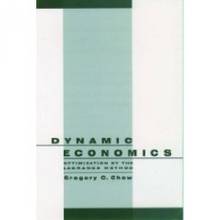Dynamic Economics: Optimization by the Langrange Method
Chow, Gregory
Éditeur : OXFORD UNIVERSITY PRESS
ISBN papier: 9780195101928
Parution : 1999
Code produit : 1138012
Catégorisation :
Livres /
Gestion /
Économie /
Économétrie
Formats disponibles
| Format | Qté. disp. | Prix* | Commander |
|---|---|---|---|
| Livre papier | En rupture de stock** |
Prix membre : 153,90 $ Prix non-membre : 162,00 $ |
*Les prix sont en dollars canadien. Taxes et frais de livraison en sus.
**Ce produits est en rupture de stock mais sera expédié dès qu'ils sera disponible.
Description
This work provides a unified and simple treatment of dynamic economics using dynamic optimization as the main theme, and the method of Lagrange multipliers to solve dynamic economic problems. The author presents the optimization framework for dynamic economics in order that readers can understand the approach and use it as they see fit. Instead of using dynamic programming, the author chooses instead to use the method of Lagrange multipliers in the analysis of dynamic optimization because it is easier and more efficient than dynamic programming, and allows readers to understand the substance of dynamic economics better. The author treats a number of topics in economics, including economic growth, macroeconomics, microeconomics, finance and dynamic games. The book also teaches by examples, using concepts to solve simple problems; it then moves to general propositions. Aperçu limité - 1997 - 234 pages























